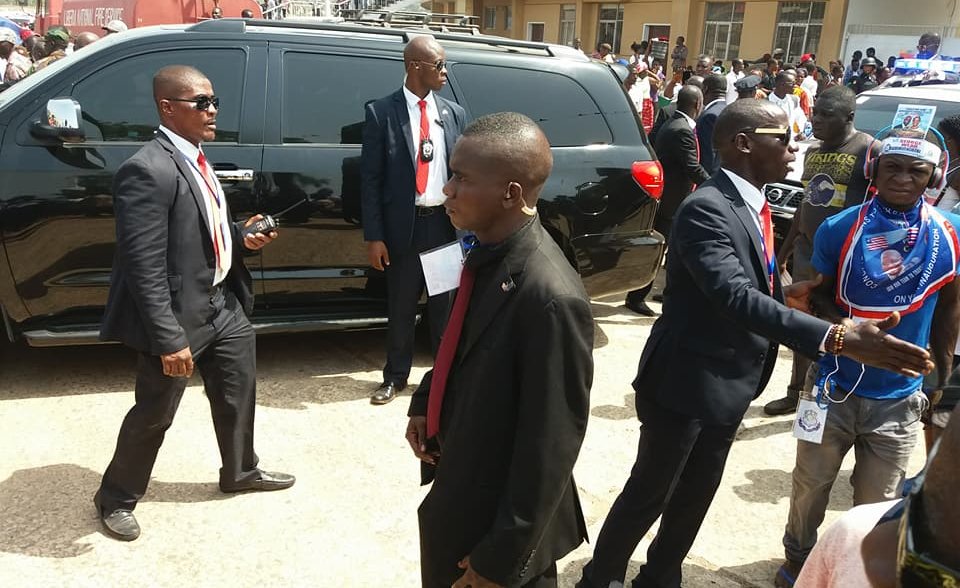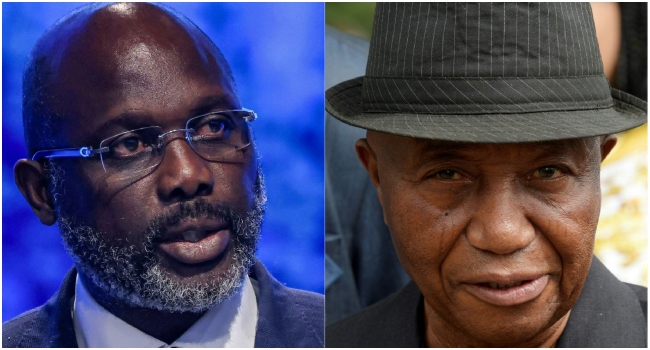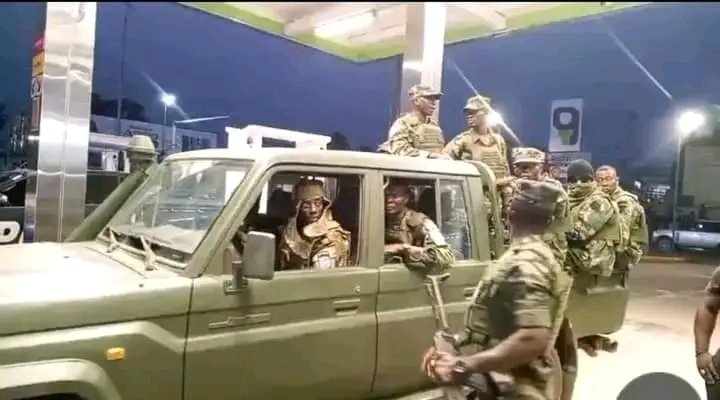The conflict between the Liberian Armed Forces (LAR) and the Liberian National Police (LNP) reflects deeper structural issues within Liberia’s security sector, governance, and ethnic dynamics. If left unresolved, this power struggle could destabilize the country, exacerbate ethnic tensions, and weaken state institutions. Addressing these challenges requires comprehensive security sector reform, stronger civilian oversight, and diplomatic intervention to prevent further escalation and ensure national stability.
Soldiers of the Armed Forces of Liberia and police officers in a violent altercation on February 26, which led to panic across Monrovia. Soldiers allegedly beat police officers who were stationed at a checkpoint in apparent retaliation for the arrest and manhandling of soldiers in plain clothes.
Both groups brought in reinforcements and created scenes “reminiscent of the country’s violent past”.
The leadership of the army has described the fracas as an “unauthorized use of force by unidentified military personnel against a police officer”, vowing to investigate and prosecute the perpetrators.
Both groups brought in reinforcements and created scenes “reminiscent of the country’s violent past”.
The conclusions of the conflict between the Armed Forces of Liberia (AFL) and the Liberia National Police (LNP) depend on how the situation unfolds and is managed. here are some key takeaways Based on historical patterns and potential implications,:
1. Weaknesses in Security Sector Coordination
- The clash highlights poor coordination between Liberia’s security forces, suggesting a lack of clear roles, communication, and command structures.
- It exposes gaps in crisis management and the chain of command within the security sector.
Signs of a lack of clear roles, communication, and command structures within Liberia’s security forces include:
- Jurisdictional Overlaps and Power Struggles – Conflicts between the Liberian Armed Forces (LAF) and the Liberian National Police (LNP) suggest an unclear division of responsibilities. Instances where the military intervenes in civilian policing duties indicate a blurred chain of command.
- Frequent Clashes and Rivalries – Armed confrontations, disputes, or operational conflicts between security agencies highlight coordination failures and competing authorities.
- Inconsistent or Contradictory Directives – Different security agencies may receive conflicting orders from leadership, leading to confusion on the ground.
- Breakdown in Crisis Response – Delays or mismanagement in handling security threats due to unclear chains of command suggest poor inter-agency coordination.
- Ethnic and Political Bias in Security Deployment – If security forces align with political factions or ethnic groups rather than national interests, it signals a lack of centralized control and professional discipline.
- Poor Intelligence Sharing – Security threats may go unaddressed due to failures in communication between agencies responsible for national defense and law enforcement.
- Low Public Confidence in Security Institutions – When citizens see security agencies operating at odds with each other, it weakens trust in law enforcement and the military, raising concerns about national stability.
Addressing these issues requires clearer mandates, improved training, and stronger oversight mechanisms to ensure effective security governance.
2. Risks to National Stability
- If not resolved swiftly, the conflict could escalate and create broader instability, especially if security forces become divided or take sides in political disputes.
- Such incidents undermine public confidence in the ability of the government to maintain order.
3. Need for Institutional Reforms
- The government must strengthen oversight mechanisms for both the AFL and LNP to prevent future clashes.
- Better-defined jurisdictional boundaries between military and police forces are necessary to avoid power struggles.
4. Political and Ethnic Sensitivities
- If not handled carefully, the conflict could be exploited by political actors or deepen ethnic divisions within security institutions.
- There is a need for proactive measures to ensure that ethnic or regional tensions do not influence security operations.
5. Importance of Civil-Military Relations
- Liberia’s history of military coups and political interference by security forces makes it crucial to maintain civilian oversight over the AFL and LNP.
- Strengthening accountability and ensuring security forces remain apolitical will be key to preventing similar incidents in the future.
6. Potential Diplomatic and Regional Concerns
- Liberia’s neighbors and international partners, who have supported its post-war security reforms, may increase scrutiny and pressure for improved governance.
- Continued incidents like this could affect foreign aid and security assistance, which Liberia relies on for stability.
The incident underscores the urgency for security sector reform, clear operational guidelines, and strong leadershipto maintain peace and prevent further divisions. Without decisive action, similar conflicts could threaten Liberia’s fragile democracy and security.
Recent tensions between the Armed Forces of Liberia (AFL) and the Liberia National Police (LNP) have escalated due to incidents of alleged misconduct and retaliation.
Liberia has grappled with systemic inequities, ethnic divisions, and pervasive corruption, which have undermined the cohesion and professionalism of its security institutions.
The AFL, in particular, has faced challenges related to human rights violations and indiscipline.
The recent altercations between the AFL and LNP may stem from unresolved issues within Liberia’s security sector, including:
- Inter-agency Rivalry: Competition and lack of clear jurisdictional boundaries can lead to conflicts between security agencies.
- Accountability Deficits: A history of impunity may embolden personnel to engage in misconduct without fear of repercussions.
- Ethnic and Political Influences: Deep-seated ethnic loyalties and political affiliations can exacerbate tensions and undermine unified command structures.
Addressing these challenges requires comprehensive reforms focused on enhancing professionalism, establishing clear operational protocols, and fostering inter-agency collaboration within Liberia’s security forces.
The conflict between the Armed Forces of Liberia (AFL) and the Liberia National Police (LNP) could have serious short- and long-term consequences, affecting national security, governance, and public trust. Some key potential outcomes include:
1. Escalation of Violence
- If tensions between the two forces are not properly managed, they could escalate into wider clashes, leading to instability and loss of lives.
- A breakdown in discipline within the security sector could encourage further violence, including retaliation from different factions.
2. Weakening of Law Enforcement
- A fractured security apparatus would undermine the ability of the police to maintain law and order, increasing crime rates and insecurity.
- If the military begins to take over law enforcement roles, it could lead to abuses of power and a shift away from civilian policing norms.
3. Undermining Public Trust in Security Institutions
- Citizens may lose confidence in both the police and the military, leading to fears of lawlessness and possible self-policing or vigilante justice.
- A lack of trust in the justice system could further erode government legitimacy.
4. Political Manipulation and Instability
- Politicians or interest groups might exploit the divisions within the security sector to consolidate power, creating further instability.
- Historical ethnic and political divisions in Liberia could resurface, potentially leading to factionalism within the military and police.
5. Risk of International Intervention or Sanctions
- Continued instability could attract international attention, leading to diplomatic pressure, loss of aid, or even sanctions against Liberia.
- Foreign peacekeeping forces or regional interventions (e.g., ECOWAS) might be required if the situation deteriorates further.
6. Economic and Social Consequences
- Investor confidence could decline, affecting economic growth and employment.
- A rise in insecurity could disrupt businesses, education, and daily life, deepening poverty and hardship for ordinary Liberians.
7. Possible Coup or Military Overreach
- If tensions persist, there is a risk that the military could overstep its constitutional role, possibly leading to a power grab or coup attempt.
- Historically, Liberia has experienced military interventions in politics, and renewed instability could revive fears of authoritarian rule.
Solutions to Prevent Further Escalation:
- Dialogue and Mediation: The government should facilitate peace talks between the AFL and LNP to resolve grievances.
- Clearer Operational Boundaries: Defining the roles of the police and military more distinctly can reduce overlap and competition.
- Accountability and Reform: Stronger oversight mechanisms should be implemented to ensure security forces operate within legal limits.
If not handled properly, this conflict could reverse years of post-war progress in Liberia, potentially destabilizing the country and the region.
1. Deepening Ethnic Divisions Within Security Forces
– Liberia’s security institutions have historically been influenced by ethnic politics. If the conflict between the AFL and LNP aligns with ethnic loyalties, it could further divide the security forces along ethnic lines.
– Certain ethnic groups may feel marginalized if they perceive that one faction is being favored over the other.
2. Resurfacing of Historical Grievances
– Liberia’s civil wars (1989–1997, 1999–2003) had strong ethnic dimensions, with different factions representing specific ethnic groups. A conflict within security forces could revive old tensions and fears.
– Groups that suffered persecution in the past might see the conflict as a sign of renewed instability and possible targeting.
3. Rise in Ethnic Profiling and Discrimination
– If the AFL and LNP begin to associate with specific ethnic groups, civilians from those groups may face discrimination, harassment, or unequal treatment.
– Law enforcement and military actions could be seen as biased, leading to mistrust between ethnic communities and security forces.
4. Political Exploitation of Ethnic Identities
– Politicians might exploit the division to rally ethnic support, using the crisis to gain political advantage.
– Ethnic-based political mobilization could increase, leading to heightened tensions ahead of elections or key national decisions.
5. Impact on Social Cohesion and Daily Life
– Communities that were previously peaceful could see tensions rise if people start viewing each other through the lens of the security conflict.
– Social interactions, business relationships, and even inter-ethnic marriages could suffer if fear and suspicion grow between ethnic groups.
6. Potential for Ethnic-Based Violence
– If unresolved, the security conflict could trigger ethnic clashes, particularly in mixed communities where different groups compete for influence.
– Armed groups or former warlords could exploit the situation to incite violence along ethnic lines, as seen in past conflicts.
Preventative Measures to Avoid Ethnic Fallout
– Promote Unity in Security Forces: Ensure recruitment and leadership positions in both the AFL and LNP reflect national diversity.
– Strengthen Ethnic Reconciliation Efforts: Community dialogues should be encouraged to address historical grievances and prevent division.
– Depoliticize the Security Conflict: Leaders must avoid ethnic rhetoric and ensure that security decisions are based on professionalism rather than ethnic loyalty.
Liberia has made progress in post-war reconciliation, but if this conflict is not handled carefully, it could reawaken dangerous ethnic divisions and threaten national stability.
The beneficiaries of the conflict between the Armed Forces of Liberia (AFL) and the Liberia National Police (LNP) depend on the motives behind the tensions and how different actors exploit the situation:
1. Political Actors and Opposition Groups
- Politicians seeking power could use the conflict to discredit the government, claiming a failure in security sector management.
- Opposition leaders might exploit the tensions to fuel public dissatisfaction and gain political leverage.
2. Corrupt Officials and Criminal Networks
- Smugglers, illegal miners, and drug traffickers benefit from a weakened security apparatus, as infighting between security forces distracts from law enforcement efforts.
- Corrupt elements within the police or military might use the chaos to advance their interests, such as controlling illicit businesses or extorting civilians.
3. Ethnic and Regional Power Brokers
- If the conflict has ethnic undertones, leaders of affected ethnic groups might use it to rally support or push for more influence within the security forces.
- Certain factions may seek to reshape security leadership to favor their group.
4. External Actors and Instigators
- Foreign interests—such as regional actors or economic competitors—may exploit instability to influence Liberia’s policies, trade, or security strategies.
- Some groups might seek to destabilize the government for strategic or economic advantages.
5. Media and Information Manipulators
- Sensationalist media outlets or social media influencers could profit from the situation by spreading narratives that attract viewership, whether accurate or misleading.
- Propaganda agents may manipulate public perception to serve particular interests.
Final Thought:
While the general public and Liberia’s long-term stability suffer from such conflicts, various groups—political, criminal, ethnic, or foreign—could exploit the unrest for personal or strategic gain if the situation is not contained swiftly.
The situation between the Liberia Armed Forces (AFL) and the Liberia National Police (LNP) could evolve in several directions, depending on government actions, public response, and external influences. Here are some possible scenarios:
1. Peaceful Resolution & Institutional Reforms (Best-Case Scenario)
- Government intervention successfully de-escalates tensions through dialogue, mediation, and institutional reforms.
- Clearer role definitions for both security forces help prevent future conflicts.
- International partners (ECOWAS, AU, or UN) may assist in security sector reforms to restore professionalism and coordination.
- Public trust in security institutions is restored, preventing ethnic or political exploitation of the crisis.
👉 Outcome: The situation stabilizes, strengthening Liberia’s democratic governance and security sector professionalism.
2. Political Exploitation & Increased Instability
- Political actors or opposition figures manipulate the conflict for their own agendas, escalating tensions.
- Divisions within the security forces could weaken national security, increasing crime and lawlessness.
- Ethnic and regional loyalties within security forces could be exploited, leading to internal factionalism.
- Anti-government protests might erupt if the public perceives the government as incapable of managing security forces.
👉 Outcome: Liberia faces prolonged instability, weakening its institutions and slowing economic recovery.
3. Armed Clashes & Worsening Security Situation (Worst-Case Scenario)
- Mismanagement of tensions could lead to violent confrontations between AFL and LNP.
- If ethnic or political divisions deepen, Liberia risks a security sector split, similar to past internal conflicts.
- Criminal groups and foreign actors could exploit the weakened security structure, leading to a rise in organized crime.
- A military faction might overstep its authority, leading to a constitutional crisis or even military intervention in governance.
👉 Outcome: Liberia risks plunging into instability, prompting regional or international intervention to restore order.
4. International & Regional Intervention
- If the conflict escalates, ECOWAS, the African Union (AU), or the UN might step in to mediate or impose security measures.
- Sanctions or restrictions could be imposed on Liberian officials if human rights abuses occur during crackdowns.
- Liberia’s fragile democracy could come under increased scrutiny, leading to loss of international trust and investment.
👉 Outcome: Liberia avoids full-blown conflict but faces diplomatic pressure and economic consequences.
Conclusion
The trajectory of this crisis depends on government leadership, institutional discipline, and external mediation. The best course of action is early intervention through dialogue, accountability, and structural reforms before the situation escalates into a broader crisis.

More on this story: Cleansing in EPS signals about possible coup risks in Liberia

More on this story: Liberia could hope for peaceful transition of power in January next year




